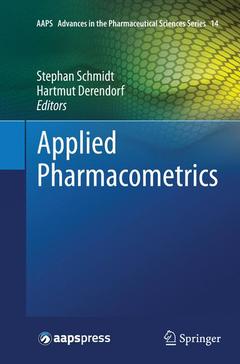Applied Pharmacometrics, Softcover reprint of the original 1st ed. 2014 AAPS Advances in the Pharmaceutical Sciences Series, Vol. 14
Coordonnateurs : Schmidt Stephan, Derendorf Hartmut

This comprehensive volume provides an update on the current state of pharmacometrics in drug development. It consists of nineteen chapters all written by leading scientists from the pharmaceutical industry, regulatory agencies and academia. After an introduction of the basic pharmacokinetic and pharmacodynamic concepts of pharmacometrics in drug development, the book presents numerous examples of specific applications that utilize pharmacometrics with modeling and simulations over a variety of therapeutic areas, including pediatrics, diabetes, obesity, infections, psychiatrics, Alzheimer?s disease, and dermatology, among others. The examples illustrate how results from all phases of drug development can be integrated in a more timely and cost-effective process.
Applying pharmacometric decision tools during drug development can allow objective, data-based decision making. At the same time, the process can identify redundant or unnecessary experiments as well as some costly clinical trials that can be avoided. In addition to cost saving by expedited development of successful drug candidates, pharmacometrics has an important economic impact in drug product selection. Unsuccessful drug candidates can be identified early and discontinued without expending efforts required for additional studies and allocating limited resources. Hence, pharmacometric modeling and simulation has become a powerful tool to bring new and better medications to the patient at a faster pace and with greater probability of success.
.- 1 Introduction to Pharmacometrics and Quantitative Pharmacology with an Emphasis on Physiologically Based Pharmacokinetics
.- 2 Personalized Medicine – Integrating Individual Exposure and Response Information at the Bedside
.- 3 Pharmacometrics in Pediatrics
.- 4 Pharmacometrics in Chronic Kidney Disease
.- 5 Drug-Disease Model-Based Development of Therapeutic Agents for Treatment of Diabetes
.- 6 Applied Pharmacometrics in the Obese Population
.- 7 Pharmacometrics in Cardiovascular Safety
.- 8 Pharmacometrics in Bacterial Infections
.- 9 Pharmacometrics in Viral Infections
.- 10 Applied Antifungal Pharmacometrics: Fluconazole and Echinocandins in the Treatment of Candidemia and Invasive Candidiasis
.- 11 Pharmacometrics and Tuberculosis
.- 12 Pharmacometrics in Pulmonary Diseases
.- 13 State-of-the-Art Pharmacometric Models in Osteoporosis
.- 14 Pharmacometrics in Psychiatric Diseases
.- 15 Clinical Trial Simulation in Alzheimer’s Disease
.- 16 Pharmacometric Applications in Inflammation
.- 17 Pharmacometrics in Dermatology
.- 18 Pharmacometrics in Pain Management
.- 19 Pharmacometrics of Hyperlipidemia.
Stephan Schmidt is an Assistant Professor at the University of Florida’s Center for Pharmacometrics and Systems Pharmacology in Lake Nona, Orlando, Florida. Prof. Schmidt’s research focuses on the application of quantitative analysis (pharmacometrics and systems pharmacology) tools to address clinically relevant research questions in the area of antimicrobial chemotherapy, pediatrics, diabetes, cardiovascular safety and post-menopausal osteoporosis. Prof. Schmidt received his Ph.D. in Pharmaceutics from the University of Florida in Gainesville, Florida. He has published his work in more than ten peer reviewed scientific journals and received the Paul Ehrlich Society Thesis Award as well as the University of Florida’s Excellence Award for Assistant Professors. Prof. Schmidt is an active member of the International Society of Pharmacometrics (ISoP), the American Society for Clinical Pharmacology and Therapeutics (ASCPT), the American Association of Pharmaceutical Scientists (AAPS), the American College of Clinical Pharmacology (ACCP), and the Paul-Ehrlich Society for Chemotherapy (PEG).
Hartmut Derendorf is Distinguished Professor, V. Ravi Chandran Professor of Pharmaceutical Sciences and Chairman of the Department of Pharmaceutics at the University of Florida College of Pharmacy in Gainesville, Florida. He received his Ph.D. in Pharmaceutics at the University of Münster in Germany. Prof. Derendorf has published more than 400 scientific publications and seven textbooks in English and German. He is Editor or Associate Editor of five journals including the Journal of Clinical Pharmacology. Prof. Derendorf has served as President of the American College of Clinical Pharmacology (ACCP) and President of the International Society of Antiinfective Pharmacology (ISAP). He was awarded the Distinguished Research Award and the Nathaniel T. Kwit Distinguished Service Award of ACCP, the Research Achievement Award in Clinical Science of the
Describes how pharmacometric and modeling simulation techniques have been applied to the development of therapeutics, with case examples
Examines the use of pharmacometrics in patient populations key to successful regulatory approval applications
Illustrates how results from all phases of drug development can be integrated in a more timely and cost-effective process
Includes supplementary material: sn.pub/extras
Date de parution : 09-2016
Ouvrage de 565 p.
15.5x23.5 cm
Date de parution : 12-2014
Ouvrage de 565 p.
15.5x23.5 cm
